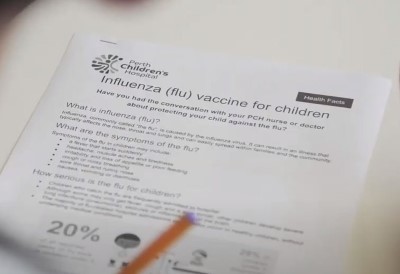Search

News & Events
RSV and influenza detections hit record low levels in 2020Western Australia has experienced historically low levels of respiratory syncytial virus (RSV) and influenza this winter due to the public health measures implemented to prevent the spread of COVID-19.
Research
The impact of Influenza infection during early life on immune developmentThis study will investigate the why disease is worse in infants and how early life viral infection impacts the developing immune system.

News & Events
Flu jab for school kids best defence from virus, experts sayUp to 40,000 influenza cases could be prevented in Western Australia this winter if more primary school-aged children were vaccinated, researchers at The Kids Research Institute Australia have found.
Research
Parainfluenza Virus Infection in an Australian Community-based Birth CohortIn a community-based birth cohort of 158 Australian infants followed to age 2 years, the incidence rate of human parainfluenza virus (HPIV) was 0.42 (95% CI = 0.33, 0.54) episodes per child-year with episodes occurring year-round, peaking in the spring season.
Research
Influenza vaccination among pregnant women in two hospitals in Sydney, NSW: what we can learn from women who decline vaccinationPregnant women are recognised as being at risk of serious illness from influenza. Despite this, and longstanding national recommendations for vaccination in pregnancy, vaccine uptake remains suboptimal. This study aims to determine factors associated with women declining influenza vaccination in pregnancy.
Research
Impact of influenza on hospitalization rates in children with a range of chronic lung diseasesThis large population-based study suggests a significant healthcare burden associated with influenza in children with a range of chronic lung diseases
Research
Intraseason decline in influenza vaccine effectiveness during the 2016 southern hemisphere influenza season: A test-negative design study and phylogenetic assessmentOverall, the 2016 influenza vaccine showed good protection against laboratory-confirmed infection among general practice patients
Research
Haemophilus influenzae remains the predominant otitis media pathogen in Australian children undergoing ventilation tube insertion in the PCV13 eraUnderstanding patterns of bacterial carriage and otitis media (OM) microbiology is crucial for assessing vaccine impact and informing policy. The microbiology of OM can vary with geography, time, and interventions like pneumococcal conjugate vaccines (PCVs). We evaluated the microbiology of nasopharyngeal and middle ear effusions in children living in Western Australia, 11 years following the introduction of PCV13.
Research
Effectiveness of 2023 southern hemisphere influenza vaccines against severe influenza-associated illness: pooled estimates from eight countries using the test-negative designAnnual estimates of seasonal influenza vaccine effectiveness can guide global risk communication and vaccination strategies to mitigate influenza-associated illness. We aimed to evaluate vaccine effectiveness in countries using the 2023 southern hemisphere influenza vaccine formulation.
Research
How immunity shapes the long-term dynamics of influenza H3N2Since its emergence in 1968, influenza A H3N2 has caused yearly epidemics in temperate regions. While infection confers immunity against antigenically similar strains, new antigenically distinct strains that evade existing immunity regularly emerge ('antigenic drift'). Immunity at the individual level is complex, depending on an individual's lifetime infection history.
